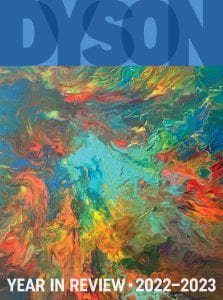 The New Face
The New Face
of Trauma
Groundbreaking research indicates there
could be a positive side to negative events.
Can anything positive possibly come from an adverse event such as a flood, a mass shooting, or a catastrophic accident? The answer is yes, according to trauma researcher Anthony Mancini, PhD, associate professor of psychology and founder of the Trauma, Social Processes, and Resilience Lab at Dyson College, established on the Pleasantville campus in 2015. In February 2019, Mancini’s paper, titled “When Acute Adversity Improves Psychological Health: A Social-Contextual Framework,” was published in the journal Psychological Review, describing what he calls “psychosocial gains from adversity.”
The pioneering analysis upends the prevailing idea that trauma is uniformly harmful to our well-being, and it offers new insight into how we handle such events.
“It questions the idea that trauma can’t actually have some real beneficial consequences,” Mancini says. “No one has ever put forth a theory to try and provide an overarching framework for this idea.”
In the paper, Mancini suggests that adversity has the potential to encourage cooperation, promote deeper social interactions, and improve psychological functioning as a result of the shared experience. He found that there’s a tendency to come together after a disturbing event, and that human connection can help us access strength and resiliency. We experienced the phenomenon on a national level after 9/11, and you can see it on a more specific level in your own social circles. For example, the death of a loved one may make you feel close to relatives you haven’t seen in years, and that could have beneficial consequences for you and, in turn, your other family members.
By providing an explanation of how our relationships with others can impact response to tragedy in positive ways, Mancini’s findings could better inform how we approach disaster management, and offer new insight into post-traumatic stress disorder.
“It’s looking at the human experience as a layered, multilevel phenomenon,” Mancini says. “The emphasis on the social context and on the potential of trauma to directly stimulate improved psychological functioning marks it as distinct from any other trauma theory.”

